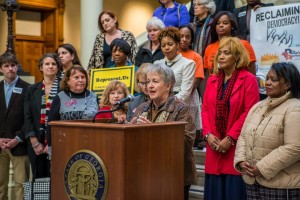Orrock, Drenner Introduce Citizens United Resolution, Call for U.S. Constitutional Amendment
Photograph by Steve Eberhardt
(APN) ATLANTA — On Wednesday, January 21, 2015, the fifth anniversary of the Citizens United v. Federal Election Commission decision of the Supreme Court of the U.S., State Sen. Nan Orrock (D-Atlanta) and Rep. Karla Drenner (D-Avondale Estates) announced the introduction of resolutions calling for a U.S. Constitutional Amendment to allow U.S. Congress to place common-sense limits on campaign contributions.
The 2010, the U.S. Supreme Court’s 5-4 decision opened the floodgates for unlimited corporate spending in federal elections and granted corporations the same free-speech rights as individuals. The result has been to breed the inequity of influence and imbalance of power which endanger the integrity of democratic process.
Drenner’s bill, HR 126, was introduced on January 29, 2015, and is in the House Hopper. Orrock’s bill does not appear to have been introduced to date.
Drenner’s bill is co-sponsored by State Reps. Michele Henson (D-Stone Mountain), Pat Gardner (D-Atlanta), and Tyrone Brooks (D-Atlanta).
“WHEREAS, free and fair elections are essential to democracy and effective self-governance; and,” the resolution states.
“WHEREAS, United States Supreme Court rulings, beginning with Buckley v. Valeo and continuing through Citizens United v. Federal Election Commission and others, disproportionately elevate the role of wealthy special interests in elections and diminish the voices and influence of ordinary Americans; and,”
“WHEREAS, the ensuing flood of money into our electoral system threatens political equality by allowing personal wealth to translate into political power; and,”
“WHEREAS, the members of this body support an amendment to the United States Constitution regarding campaign finance that would firmly establish the following: (1) that, to advance democratic self-government and political equality and to protect the integrity of government and the electoral process, Congress and the States may regulate and set reasonable limits on the raising and spending of money by candidates and others to influence elections; and (2) that Congress and the States shall have power to implement and enforce this article by appropriate legislation, and may distinguish between natural persons and corporations or other artificial entities created by law, including by prohibiting such entities from spending money to influence elections,”
“NOW, THEREFORE, BE IT RESOLVED BY THE HOUSE OF REPRESENTATIVES that the members of this body call upon each member of the Georgia Congressional Delegation to actively support and promote in Congress an amendment to the United States Constitution on campaign finance,” the resolution states.
Previously, as reported by Atlanta Progressive News, at least two Georgia cities have passed resolutions supporting such a Constitutional Amendment, including the City of Atlanta and the City of Savannah. Councilman Michael Julian Bond (Post 1-at-large) introduced the Atlanta resolution, which APN’s News Editor helped to draft.
http://atlantacityga.iqm2.com/Citizens/Detail_LegiFile.aspx?MeetingID=1423&ID=5239
In addition, the states of Delaware, Illinois, Montana, and Vermont have passed resolutions or referenda calling for such a Constitutional Amendment.
The resolutions brought by Sen. Orrock and Rep. Drenner have low chance of making headway or passing in the Legislative Session.
When asked about the impetus and timing for driving the resolution, Sen. Orrock responded, “Almost every news cycle reveals more information every day about dark money and now we learn that the Koch Brothers are committed to outspending the Republican and Democratic parties in the 2016 elections. We need to help the public connect the dots.”
“Chilling – you can see it in the last state elections, 900 state Democrats lost seats, tracking now after five years of Citizens United. You really see the drastic change of who is serving in office… Look at Arkansas, the Koch Bros spent sixteen million dollars in campaign funding and toppled a democratic majority in the Arkansas State Senate changing six seats! This is a stark example of how dark money can distort election outcomes – who holds power and what public policy gets made.”
“Through the network of women legislators of WiLL (Women Legislators’ Lobby), I hear great consternation from across the nation about the damaging results of unlimited sums of money spent in political campaigns,” Orrock told APN.
A diverse coalition of advocacy groups joined the Georgia legislators to stand in solidarity in the “reclaim democracy” event at the Capitol including: Georgia Public Interest Research Group (PIRG), Georgia Women’s Action for New Directions (WAND), The Coalition for the People’s Agenda, the American Federal of Labor and Congress of Industrial Organizations, Georgia STAND UP, League of Women Voters of Georgia, EcoAction, Environment Georgia, Georgia Equality, Planned Parenthood, Partnership for Southern Equity, Women Engaged, Nuclear Watch South, American Friends Service Committee, and Moral Monday Georgia.
It was a different group of advocates standing in the Capitol, in comparison to when the Atlanta City Council was considering similar legislation, when none of these groups were present, and a handful of advocates from Move to Amend helped push the legislation through Council.
Groups like MoveOn.org and Move To Amend drive this issue on a national platform. Georgia groups are beginning to coalesce together to address campaign reform and abuse of corporate power.
“Five years ago today, the Supreme Court went way off track, and gave mega-donors and corporate interests free rein to drown out the voices of the majority,” Michael Sikora of Georgia PIRG, said during the event. “But we’re here today because the decision also sparked a movement of Americans working to take back our democracy, city-by-city and state-by-state.”
(END/2015)
